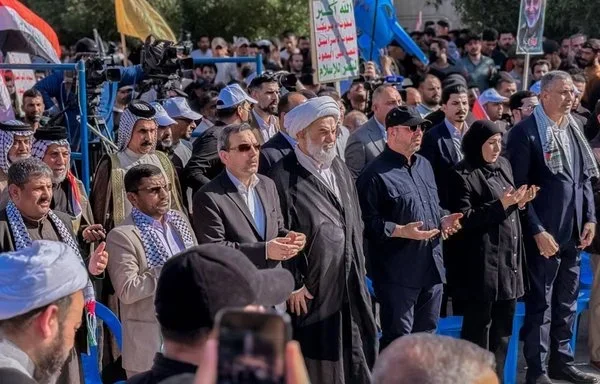Security
Houthis undermine Baghdad as they seek to expand footprint in Iraq
Houthi fighters form the core of a new battalion in Iraq that is supervised by fellow 'axis of resistance' member Katabib Hizbullah.

By Anas al-Bar |
ADEN -- The Houthis have been expanding their presence and network in Iraq with the support and protection of Iran-backed Iraqi militias, to the detriment of their host country, sources told Al-Fassel.
In a March 26 post on X, Yemen's Minister of Information Muammar al-Eryani claimed that Houthi fighters form the core of the new Hassan Nasrallah Battalion, a force under the supervision of Kataib Hizbullah.
Most of the battalion's 700 to 1,200 fighters hail from Yemen's Hajjah and Saada provinces, with militiamen who fled Syria after the collapse of the Bashar al-Assad regime also represented in the ranks.
This is in line with the Houthis' plans to expand their presence in Iraq, where "members have joined Iraqi militias and transferred some of their operations from Yemen to Iraq," Foreign Policy magazine said.
The Houthis and Iran-backed Iraqi militias are part of the so-called "axis of resistance," and there is evidence of an exchange of expertise between them.
In mid-2024, the Houthis opened a legation office in Baghdad, and now have smaller offices in Kirkuk and southern Iraq, per Foreign Policy.
Iraqi militiamen travel to Yemen to train the Houthis on combat techniques and the deployment of drones and improvised explosive devices (IEDs).
Iraqi militias also offer the Houthis financial support, to the tune of around $100 million a year, through illegal oil shipments and donations collected illegally from shrines and public places, al-Eryani said.
A burdensome presence
In an attempt to circumvent international sanctions, the Houthis have sought to open bank accounts in Iraq, al-Eryani said, reflecting the group's ongoing attempts to secure alternative sources of funding to support their operations.
There are reports that the Houthis' representative in Iraq, Abu Idris al-Sharafi, recently left due to fears of being targeted, and is probably hiding in a secret location under the protection of Kataib Hizbullah, he said.
Meanwhile Ali al-Azzi is taking on his role.
Iraqi Center for Strategic Studies head Ghazi Faisal Hussein pointed to the Houthis' ties to the Iranian regime "and their role in serving Tehran's chaos-inducing projects in the region."
He stressed the need to "prevent Iran's proxies from using Iraqi territory as a platform to coordinate and manage their hostile activities and to garner wealth from the money of the Iraqi and Yemeni people."
The Iraqi government has begun to feel the Houthi presence in Baghdad is a political burden, in light of current challenges and the fear of US-Iran escalation, a political source in Baghdad told Al-Araby Al-Jadeed.
A considerable part of the Houthis political and media activities have been suspended, the source said, but the group's representatives remain in Iraq.
Beautiful
Well done
Unusual and beautiful
The Houthis are undermining Baghdad as they seek to expand their influence in Iraq.